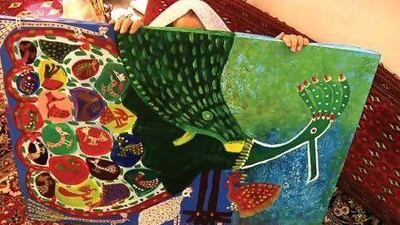You wouldn't know it from the daily rain showers or the unseasonably cold weather, but a piece of the Middle East made its way to the north of England last week.
Films from Lebanon, Yemen, Iran, Egypt, the Palestinian territories and elsewhere made up the largest collection of cinema from the region to be shown in the history of the Sheffield Doc/Fest, one of the world's leading non-fiction film and television events.
It was hardly a surprise that the Arab Spring inspired more stories than any other subject this year (including The Reluctant Revolutionary, 1/2 Revolution and a number of short films), but the ever-present Israeli-Palestinian conflict reared its head more than once as well.
Challenging the unfortunate stereotype about the region's films - that they focus almost exclusively on violent unrest - was the charming Going Up the Stairs, about an idiosyncratic Iranian housewife who is unexpectedly embraced by the Parisian art community.
"This year, the quality of films from the Middle East was exceptional," says Hussain Currimbhoy, film programmer at the festival. "Everyone's out there uncovering stories that make sense of the massive changes happening in the region.
"Arab documentary film is nothing new, but there's a feeling that the events of the last year or so have been what these filmmakers were waiting for.
"They tell stories about real people and I hope they will open-up much needed dialogue."
Many of the region's filmmakers travelled to Sheffield to present their work in person, and the festival even included a panel discussion, debating whether the current volume of documentaries is likely to be sustained. With many of the films set to appear at festivals and on television across the region, here are some of the ones to look out for:
The Law in These Parts
A film that has led to its Israeli director being labelled anti-Semitic in his homeland, The Law in These Parts meticulously examines the perverse legal system in place in the Palestinian Territories. It sees the director Ra'anan Alexandrowicz grilling a number of retired military judges, who devised and enacted the laws that still see Palestinian protesters imprisoned without charge and international law-defying settlements built with impunity. It may sound a little stodgy, and at times it is, but the filmmaker's inspired decision to splice powerful archive footage into the background of interviews (using a green screen) lends the film artistic flair.
Sector Zero
Exploring the derelict Karantina neighbourhood of Beirut - the location of the city's slaughterhouse, as well as the historical home to its refugee populations and the site of an infamous 1976 massacre - the director Nadim Mishlawi thinks of his film as a kind of audio-visual poem. Comprising artfully rendered images of rusty metal girders and spiders' webs, all set to mournful music, the film has the occasional profound moment, but is more often a laborious and pompous affair. Shunning the observational, narrative-driven style that is the norm in favour of something much less appetising, it is included here to demonstrate the diversity that now exists among Middle Eastern documentaries.
5 Broken Cameras
For six years, the West Bank resident Emad Burnat filmed the brutal treatment of his fellow villagers by IDF soldiers. However, he measures the experience not in years, but by the number of cameras that were smashed or shot by his adversaries over that time. As well as delivering visceral images of the clashes, including skies filled with plumes of tear gas, lifeless bodies and olive groves set alight, it also tells a thoroughly personal story about the immense physical and emotional price of his endeavours. The film not only serves as a remarkable and often infuriating window through which to view the occupation, but also demonstrates how filmmaking can become a dangerously compulsive pursuit.
1/2 Revolution
After screening at the Dubai International Film Festival last year and Sundance in January, 1/2 Revolution is quickly becoming the definitive documentary about the 2011 Egyptian revolution. Shot and directed by Karim El Hakim and Omar Shargawi, the film follows the delirious excitement that the prospect of Hosni Mubarak's toppling elicits in a group of westernised Cairo-dwelling friends, as well as the frustration and disappointment that followed. Their emotions are nothing compared with what's going on elsewhere in the city's streets, however. The images from Tahrir Square and beyond depict chaos and terror, as well as catharsis.
The Reluctant Revolutionary
Although shot and directed by Britain's Sean McAllister, The Reluctant Revolutionary is a tale that millions of Arabs will recognise. It follows Kais Ahmed Alkalisi, 33, a Yemeni tour guide whose personal and financial woes are compounded by the violence and uncertainty of last year's revolution in the country. He begins by opposing the struggle, fearing the overthrow of Ali Abdullah Saleh will tip the country into chaos and ruin the tourist trade, but as the Yemeni people strive to liberate themselves, the film depicts Kais undergoing a form of self-liberation, as he eventually decides to joins the revolution's ranks.
Going Up the Stairs
The film follows Akram Sartakhti, an illiterate housewife in her 60s (she was married at age nine), who is surprised to discover her favourite pastime - painting - has made her an international artist of note. But before she can travel to Paris for the first exhibition of her colourful dream-like work, the law demands that she obtain the express permission of her husband to leave the country. Not just a portrait of a unique artistic talent, but also an exploration of Iran's deeply conservative society, and a laugh-out-loud comedy, Going Up the Stairs (directed by Rokhsareh Ghaem Maghami) shows the incredible versatility that the documentary medium allows.

